- Home
- Megan Bryce
To Wed The Widow Page 4
To Wed The Widow Read online
Page 4
“And you came to ask me about it? How odd. Are you interested in applying for the position?”
He blinked. “Have all your previous husbands applied? Like a valet?” He gasped. “Do you ask for references?”
Elinor bit her tongue to keep from laughing and he said, “No wonder St. Clair is so uncharitable toward you. You have upset the order of his little world. References for a husband.”
She let a little of her laughter out in a small smile. “You can’t believe anything he says about me. He will always think the worst, I’m afraid.”
Sinclair nodded soberly. “I finally got the story from him. Dear Bertie. He was a sweet man, and I would have said that about him even when he was alive.”
“You knew him?”
“A school friend.”
“And you don’t blame me for his death, like St. Clair?”
“Grief affects everyone a little differently. St. Clair grieves by blaming you. I say, as someone who’s met your brother, that if you had the power to kill a man with putrid fever, you wouldn’t have picked Bertie.”
She looked down for a long minute, swallowing the lump that had lodged itself in her throat. Sinclair rode next to her, not saying a word for nearly a quarter of a mile.
And then he said philosophically, “Death is inevitable, and you might as well go out happy.”
When she looked at him, he held her eyes and said, “And I can’t help but believe that Bertie died as happy as any man can.”
And Elinor thought, Blue eyes. Not faded and washed out but blue as a warm summer’s day. Rare and wonderful.
Heat rushed through her body, warming her fingers and toes and all parts in between.
She swallowed and looked away. “You are wasting your time, Mr. Sinclair.”
“Am I?”
“I only make my husbands that happy.”
“Mm. Once they’ve paid the ultimate price.”
She tipped her head so that her hat covered her eyes and he could only see her mouth as she whispered, “Don’t you think it would be worth it?”
He choked out, “Yes,” and she couldn’t help her wide smile.
“You are too much fun, Mr. Sinclair. You must leave me at once. A widow can not be seen smiling so happily.”
“Or smiling so wickedly, either.”
She stopped smiling, happily or wickedly.
“Any kind of smiling.”
“Oh, yes. Your rules for widowhood. Laughing and smiling are out, then?”
“Completely.”
“Because you are looking for number six, like St. Clair says, and you don’t want to scare any prospects away?”
She didn’t answer right away. But then thought, why not? Everyone knew already.
She nodded. “I am. And I walk a very fine line between available and respectable.”
“Forgive my impertinence but I always assumed widowhood was a step up from marriage. If one had the blunt.”
“Perhaps that’s what I’m looking for then. A man with blunt.”
His eyes traveled down her very expensive habit. “I don’t think that’s what you’re looking for. Perhaps you’re simply one of those women who isn’t happy without a man at your beck and call.”
He murmured, so only she could hear on the busy road, “One of those women who isn’t happy without a man in your bed.”
She ignored the heat flushing away the cold she’d lived with for too long, ignored the pitter-patter of her heart as it raced to keep up with him, and said, “Respectable, Mr. Sinclair. Don’t forget.”
“You are as far from respectable as you can get, Lady Haywood, and still be welcomed by society.”
She wasn’t welcomed by society. She was tolerated. And she wouldn’t have even that if she chose poorly for her next husband.
“I’m as respectable as I have to be, Mr. Sinclair. And unless you have those references, I think our conversation is over for today.”
He doffed his hat, bowing to her over the side of his horse. He rode a little ahead of her, leaving her as she’d asked him to do.
And then he turned his horse and stopped, right in front of her. She pulled back on the reins and her horse stopped, didn’t fidget or prance, just stopped.
He watched her well-behaved horse and said again, “We all dance to your tune, it seems, my lady. But tell me one thing and I will leave you alone with your respectability. Do you truly mourn them? Bertie and the others?”
She didn’t stop to think. “Yes.”
And she didn’t lie to him. She mourned them all, if not because she’d loved them, then because she’d been as happy as she could be with them.
Because with them, she hadn’t been alone.
“Despite my particular rituals, I mourn them all.”
She steered her horse around his, walking away from sunny blue eyes that didn’t think she’d killed dear Bertie.
Who thought dying under her care was the best a man could expect in this life.
Flattery will get you everywhere, Elinor.
Her father’s words rang in her ears and she wondered who’d taught Mr. Sinclair that particular truth. She doubted it was his father. Earls didn’t need to learn flattery.
She didn’t look back at him. Didn’t need to because she knew he was still stopped in the middle of the road watching her.
Forcing traffic to flow around him as he simply sat. And watched.
Another ball, this time George was accompanied by the earl and the countess.
His chaperones.
And he knew he was looking at one long night of twirling this young girl and that not-too-old spinster around the dance floor.
Virgins. Who wouldn’t know how to dance that fine line between fun and scandal. Who wouldn’t even know there was a line.
The earl scanned the room, the same light shining in his eyes that he got at the horse market.
The countess, a little more discreet in her perusal but still cataloging every girl in the room like she was trying to find herself the perfect hat.
Bloody hell.
George headed to the card room, wondering how long his brother would let him hide. And then deciding the earl would probably let him hide until it was time to stand in front of the vicar.
George’s spirits rose abruptly when he entered the card room and saw blond hair and rich black. Blue eyes that rose to meet his from her cards.
He made his way to Lady Haywood’s table and watched silently as play went round.
He wasn’t surprised that she played as disciplined as she’d trained her horse.
He wasn’t surprised that she was playing high.
“Quite a game, gentleman. Lady Haywood.”
She swept in an armful of fish and said, “Are you going to join us, Mr. Sinclair?”
George watched another round before answering to the negative.
“You don’t like to gamble?”
“Not when I’m going to lose.”
She liked that and her eyes glittered at him. Her opponents seemed oblivious to their imminent ruin and George made his way around the table and bent his head to whisper in her ear.
“I prefer to be watching when a lady bankrupts her opponents.”
Lady Haywood brought her cards up to look at them, allowing George a glance since his chin was still resting just above her shoulder.
George looked down, breathing in the scent swirling from her hair and rising from her bosom, and he told himself he was looking at her cards and not her chest.
And when another round had gone by without him having any idea who had taken the tricks, he realized how silly that had been. Of course he’d been looking down her dress.
“Mr. Sinclair?”
“Hmm?”
“You’re distracting me,” she said as she took another trick.
“I don’t know how I’ll ever make this up to you, my lady. Distracting you like this.”
“Is there perhaps another game you might like to join in on?”
“Perhaps a game of dice. Will you join me?”
She finished the game first before leaving the table but Elinor’s heart raced, and she told herself it was from the thrill that came from winning. Told herself that it came from the effort of paying attention to a quick moving game.
And when she slipped her arm through Sinclair’s, felt his solidness beneath her fingers and the heat radiating from him, she couldn’t have said how much she’d just won.
They meandered through the tables, watching others win and lose, and Sinclair said, “Remind me not to play cards with you, Lady Haywood.”
“Won’t be necessary. You are entirely too distracting to even bother with.”
He chuckled. “Obviously.” He shook his head. “Ye gads. You must have touched a bun before sitting down.”
“I don’t count on luck when skill is more reliable.”
In Elinor’s experience, skill was always more reliable than luck. She couldn’t count on what she’d never had.
Sinclair stopped at a Hazard table, though he seemed as uninterested in the game as she.
“Do I have any hope in persuading you to dance tonight? Or will we be stuck in here watching men sweat as they gamble away what they can ill afford to lose.”
She shook her head, pretending she had no desire for dancing.
He said, “But I distracted you and must make up for it. Or you distracted me. I do feel a bit at sea.”
She doubted he was distracted or befuddled but she explained to him again.
“I’m still in deep mourning, Mr. Sinclair. Of course.”
He laughed, low and long, and his chest reverberated against the back of her hand.
“The only people in this room who are in mourning are your poor opponents. I hope you made the game worth their while, Lady Haywood.”
She murmured, “I always do,” and he turned his head to look into her eyes.
“Yes. That’s the impression I get.”
He turned back to the game. “Of course, hard to know since I can’t really go ask. If only they’d left references.”
Elinor flicked her fan open and covered her mouth.
She should shoo him away, distance herself from his irreverent humor, because it was a truth universally acknowledged that a man in line for a title did not marry a scandalous widow
And Elinor was starting to think it a shame she didn’t play games she couldn’t win.
When her face was back in line, she murmured, “Will you take a turn tonight throwing the dice?”
“I may throw the dice but you will never see me sweat over how they fall. I’m afraid I’ve always thought these games were for fun.”
“These games are for winning.”
“I am getting the distinct impression that you do not know how to have fun.”
“Winning is fun.”
“Playing is fun.”
She thought with him it would be. But she pushed at him to go throw the dice until he stepped from her side, making a big show of taking the dice and blowing on them, and holding them to every lady watching and asking for the same.
He held his hand out to her. “For luck.”
She laughed. “You don’t want me blowing on them, Mr. Sinclair.”
“Says the woman who left her opponents too poor to shed tears but a moment ago.”
She closed his hand over the dice. “Yes, I did.”
His grin grew wider and he stepped back to the table, rolling the dice with a flick of the hand and never taking his eyes from her.
“Am I your opponent, Lady Haywood?”
A cheer went up at the table and Sinclair looked down. He rolled again and again, his attention snagged from her.
He laughed loudly at his good fortune and the table laughed with him. A crowd grew around the table until her view was nearly blocked and she wondered if they came to watch because he won or because he laughed.
When at last his streak ended, he made his way back to her breathless and excited.
“See. Playing. Fun.”
She laughed. “I am certain the winning had something to do with it.”
He nodded, twining his arm with hers and leaning on her heavily. “Winning. Fun.”
The room was hot, he was too much fun, her smile was too wide, her laughter too loud.
She tried to pull her arm from him and he hung on. Used every excuse to brush against her, used every movement of the crowd to pull her closer.
“And now, you,” he said, dragging her toward the table.
She shook her head and dug in her heels.
“You forget, I’ve already had my fun tonight.”
He stopped. “Too true. Dancing it is, then.”
“If somehow you could talk me into it, I doubt we could make it past your brother standing guard at the door.”
Sinclair froze for an instant, then let out a heavy sigh and leaned close enough to whisper in her ear. “Is he looking at us?”
“Yes.”
“Does he look mad?”
“Does he ever look anything but?”
“Not when I’m in the same room. The countess assures me she has seen him smile. I don’t know whether to believe her or not.”
“It must be true if the countess says it. It may be that she is the only one who’s seen it.”
The Earl of Ashmore stopped standing by the door and slowly made his way toward them through the crowd.
Elinor didn’t take her eyes from his glowering face. She said, “If I was the kind of woman who just liked to play, this would make you very nearly irresistible.”
Sinclair pulled back from her enough to see where she was looking, to see the earl bearing down on them, righteous fury in his eyes.
“Yet another someone who just can’t play but has to win. Lord, I am surrounded.”
She dropped her hand from Sinclair’s arm as the earl arrived and Sinclair finally let her go. She curtsied as much as the room allowed and said on the way down, “I can’t win against an earl.”
She was sure she heard Sinclair swear.
She was sure she heard the earl say the exact same word.
When she rose back up, the earl was glaring at her and Sinclair was glaring at the earl.
Sinclair said, “Here is your chance, Lady Haywood.”
Ashmore said, “Her chance at what?”
“To prove she is as off-putting as a Pomeranian and chase you off.”
Elinor sternly insisted to herself that Mr. Sinclair was not that funny, and when she saw Ashmore turn his glare to his brother, she stopped being entertained.
She’d seen this before. A man who wanted, fighting those who stood in his way.
Of course the last time she’d seen it, it had been between dear Bertie and George St. Clair.
She hadn’t thought then that losing a good friend had been too high a price for Bertie to pay. Had thought that eventually St. Clair would see how happy she would make his friend and yield.
They hadn’t had the chance. St. Clair had lost his friend before they could reconcile and Elinor felt, perhaps, a smidgen of sympathy for a man who couldn’t forgive himself quite as easily as she could.
She thought all this as the brothers fought their silent war. Imagined Mr. Sinclair lifeless and his brother weeping over the body.
Her heart clutched, and before the image could evaporate from her mind was curtsying again and saying to her feet, “It seems I am not.”
Elinor nearly made it out the doors. Had thought she wouldn’t even care if she was left standing out in the cool night air as her carriage was brought around if she could just get away.
But no.
Lady Ashmore positioned herself just so and called her name just a little too loud, and Elinor was forced to stop. And curtsy. And curse the whole family.
The countess smiled. “I thought that was you my husband was talking to. I can tell by the spark in your eye.”
Elinor did not smile back. “The earl speaks and we all listen.”
“Oh? I
s that why you were running off?”
Elinor had been running because she’d seen laughing blue eyes turn milky white.
The countess cocked her head. “I don’t think I’ve ever seen you look so distraught, Lady Haywood. Please forgive my husband whatever it was he said. He can be quite brash. Especially when his brother is involved.”
“His brother can be just as. . .irritating.”
The countess fanned herself and sounded genuinely sad when she said, “Oh. This will never do, I’m afraid.”
Elinor agreed with her. The widow would never do for Sinclair; Sinclair would never do for her.
“I agree with you heartily, my lady. I’m not the one who has to be told again and again.”
“Perhaps we must tell you because my brother-in-law won’t listen.”
“I’ve noticed.”
The countess laughed at Elinor’s tone. “Younger son. They learn to ignore what they don’t want to hear.”
“You would think he could hear that I’m in mourning.”
The countess looked down at Elinor’s dress. “Yes, your husband. My condolences.”
In her tone was the question of whether condolences were appropriate to offer but Elinor didn’t care. They could think of her what they liked. They would think of her what they liked.
She huffed out a breath when she saw the earl barreling toward them, rage in his eyes. The countess turned to see and said, “Oh, dear.”
Elinor thought her interjection was too mild for the death shining from the man’s eyes but perhaps the countess didn’t feel it quite as acutely since it wasn’t directed at her.
Elinor stood her ground and raised her chin. Surely the earl wouldn’t kill her right here, in the middle of a crowded ballroom. . .
The countess stepped in front of Elinor, halting her husband’s head-long rush with a smile and a lazy wave of her fan.
“Look who I ran in to, my dear? Lady Haywood. You do remember her, don’t you?”
The earl snapped out, “She is exceedingly hard to forget. Especially when as soon as she leaves one member of my family, she attaches herself to another.”
“That was my fault entirely. I chased her across the room,” the countess said and Elinor wisely decided not to point out that she hadn’t attached herself to any member of his family.
She unwisely said, “You mean as soon as I am chased away.”

_preview.jpg) To Tame A Lady (The Reluctant Bride Collection)
To Tame A Lady (The Reluctant Bride Collection)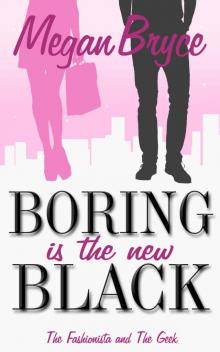 Boring Is The New Black (The Fashionista and The Geek Book 1)
Boring Is The New Black (The Fashionista and The Geek Book 1) It's Only Temporary - The Complete Collection
It's Only Temporary - The Complete Collection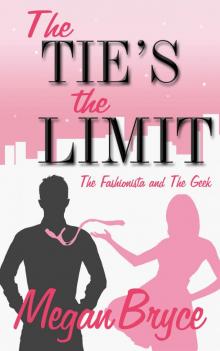 The Tie's The Limit (The Fashionista and The Geek Book 2)
The Tie's The Limit (The Fashionista and The Geek Book 2)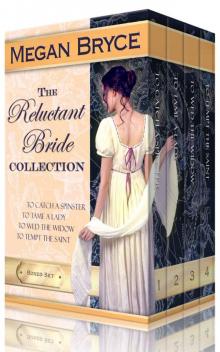 The Reluctant Bride Collection - The Complete Box Set
The Reluctant Bride Collection - The Complete Box Set Some Like It Charming (A Temporary Engagement)
Some Like It Charming (A Temporary Engagement)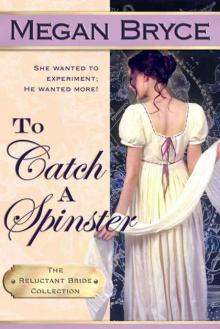 To Catch A Spinster (The Reluctant Bride Collection)
To Catch A Spinster (The Reluctant Bride Collection)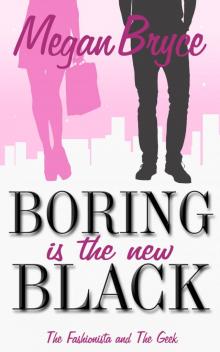 Boring Is The New Black
Boring Is The New Black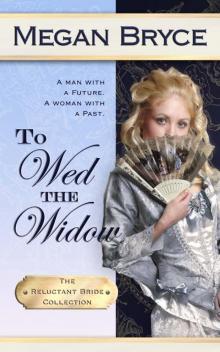 To Wed The Widow
To Wed The Widow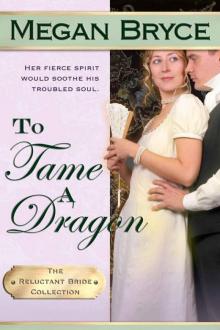 To Tame a Dragon
To Tame a Dragon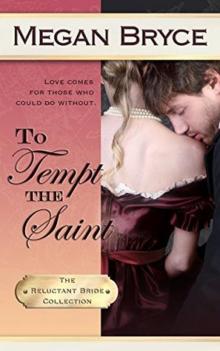 To Tempt the Saint
To Tempt the Saint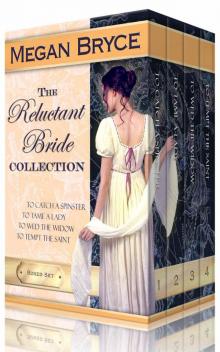 The Reluctant Bride Collection
The Reluctant Bride Collection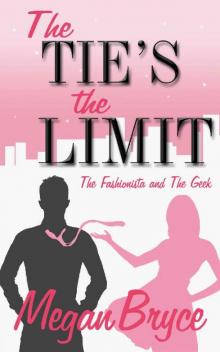 The Tie's The Limit
The Tie's The Limit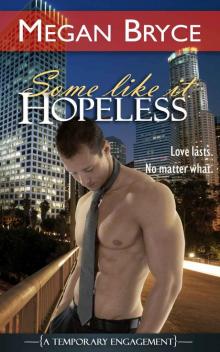 Some Like It Hopeless (A Temporary Engagement)
Some Like It Hopeless (A Temporary Engagement)